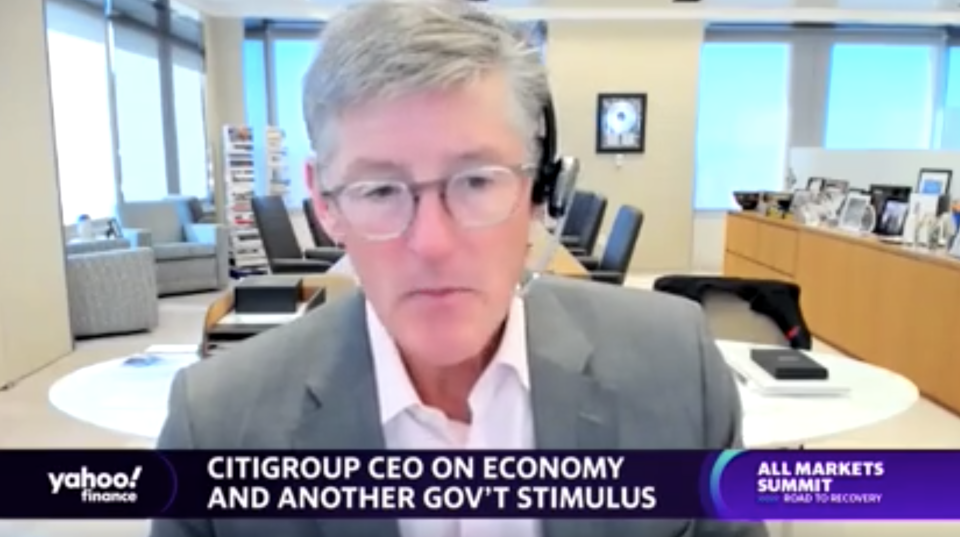Coronavirus stimulus inevitable but question is 'when': Citi CEO
Coronavirus stimulus talks in Washington D.C. have stalled ahead of next week’s presidential election, casting doubt that party leaders will ever resolve negotiations that have stretched for months, the Washington Post reports.
But another round of stimulus is ultimately inevitable, says Citi (C) CEO Michael Corbat.
In a new interview, the chief executive of the nation’s third-largest bank told Yahoo Finance that widespread agreement on the need for additional relief will prevail but acknowledged that the timeline for a measure remains unknown.
Assessing the U.S. response so far, he praised actions taken by the U.S. Treasury and Federal Reserve to mitigate economic damage wrought by the pandemic, saying the economy has performed “better than” expected.
“From a stimulus perspective, I think without a doubt people recognize that we probably do need another round,” says Corbat, who spoke to Yahoo Finance Editor-in-Chief Andy Serwer on Oct. 15, before the latest pause in stimulus talks.
“At this point, it sure feels like to me it's not about are we going to get it,” he adds. “It's when will it come and exactly how will that be designed as we go forward?”
‘A very important role’
President Donald Trump signed a $2 trillion economic relief package in March that included direct payments to Americans and expanded unemployment insurance, but those funds are running out. Negotiations between the Democratic-controlled House of Representatives and Republican-controlled Senate and White House have failed to reach an agreement on additional stimulus since then.
The $2 trillion package, the largest economic stimulus in modern American history, relied on large banks like Citi to help distribute loans to small businesses through the Paycheck Protection Program (PPP), which helped millions of small business stay open.
The Treasury Department encouraged banks to prioritize existing customers for loans under PPP, which led to favoritism toward large firms and disproportionate denial of funds to minority-owned business.
Large banks like Citi played a “very important role” in carrying out fiscal and monetary policy that blunted the economic shock of the pandemic, Corbat said. But he said another round of stimulus can improve upon prior relief in providing help where it’s most needed.
“We've got the ability to be more targeted this time in terms of those businesses, those geographies, those areas that have been more acutely affected by the virus,” he says.

Corbat spoke to Yahoo Finance Editor-in-Chief Andy Serwer in an episode of “Influencers with Andy Serwer,” a weekly interview series with leaders in business, politics, and entertainment. The conversation initially aired on Monday as part of Yahoo Finance’s annual “All Markets Summit.”
A study published earlier this month found 8 million Americans have fallen into poverty since May, and food banks report an uptick in traffic.
Meanwhile, U.S. economic output fell 5.0% in the January-to-March quarter and at a record rate of 31.4% in the April-June quarter. On Thursday, the Commerce Department announced the U.S. GDP grew at a record annualized rate of 33.1% in the third quarter, though economic output remains far lower than pre-pandemic levels.
Corbat said the U.S. economy has performed “better than” expected amid coronavirus, adding that the economic effects could have been worse.
“If we take a look at what you would think would be happening around GDP, around unemployment, around the challenges of individuals, families, small business, bigger business,” he says. “I think so far, the programs that have been put in place by the Fed, there's programs that have been put in place coming out of Treasury, have served us well.”
“What we don't know from where we are is what the forward trajectory looks like,” he adds.
Read more:
Citi ‘will be prepared’ for contested 2020 election: CEO Michael Corbat
2020 election Biden landslide ‘more likely’ than Trump win: Nicholas Kristof
Bill Gates: We should be able to ‘manufacture a lot of vaccines’ next year
Netflix co-founder on creative culture: We ‘manage on the edge of chaos’
Read the latest financial and business news from Yahoo Finance



